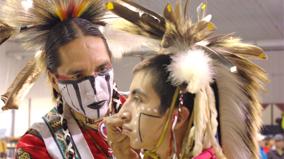Etlinisigu'niet (Bleed Down)
In five short minutes, this short film destroys any remaining shreds of the myth of a fair and just Canada. Children forced from their homes and sent to residential schools, families examined like livestock in crowded tuberculosis clinics, tainted water and land, poisoned for industry and profit at the cost of Indigenous lives, and the list goes on. But filmmaker Jeff Barnaby's message is clear: We are still here. Featuring the music of Tanya Tagaq. This film is part of Souvenir, a series of four films addressing Indigenous identity and representation by reworking material in the NFB's archives.

Extras
Details
In five short minutes, this short film destroys any remaining shreds of the myth of a fair and just Canada. Children forced from their homes and sent to residential schools, families examined like livestock in crowded tuberculosis clinics, tainted water and land, poisoned for industry and profit at the cost of Indigenous lives, and the list goes on. But filmmaker Jeff Barnaby's message is clear: We are still here. Featuring the music of Tanya Tagaq.
This film is part of Souvenir, a series of four films addressing Indigenous identity and representation by reworking material in the NFB's archives.-
directorJeff Barnaby
-
producerAnita Lee
-
executive producerAnita Lee
-
editorJeff Barnaby
-
associate producerKate Vollum
-
song performerTanya Tagaq
-
song - writerTanya TagaqJesse ZubotJean Martin
-
song - publisherThird Side Music Inc.Jesse ZubotJean Martin
-
production supervisorMark Wilson
-
technical leadMarcus Matyas
-
assistant editorTiffany BeaudinZoya Rezaie
-
studio administratorStefanie Brantner
-
production coordinatorJennifer BertlingAndrew Martin-Smith
-
producer's assistantSerena Lee
-
marketing managerMelissa Wheeler
-
publicistJennifer Mair
-
head creditsSébastien Aubin
-
title designSébastien Aubin
-
online editorLaura Aqui
-
post picture facilityFearless Films
-
stock footageFred SavardRagnhild MilewskiJosée Riopel
-
technical servicesAntonia GueorguievaJean CoulombePascal VincentAldo La RiccaWilliam Holley
Education
Ages 12 to 18
Indigenous Studies - History/Politics
Indigenous Studies - Identity/Society
Indigenous Studies - Issues and Contemporary Challenges
A short film that can be used as a starting point for conversations that deepen an understanding of the long-term effects of the disregard for Indigenous lives and land. Research the common narrative of industry poisoning land and water that directly affects Indigenous livelihood. Research the legacy of nutritional experiments in residential schools. Research “Indian hospitals,” which segregated “Indians” during times of tuberculosis. Discuss and find examples of continued hatred and inequality that permeate the Canadian healthcare system when it comes to the treatment of Indigenous Peoples.


















